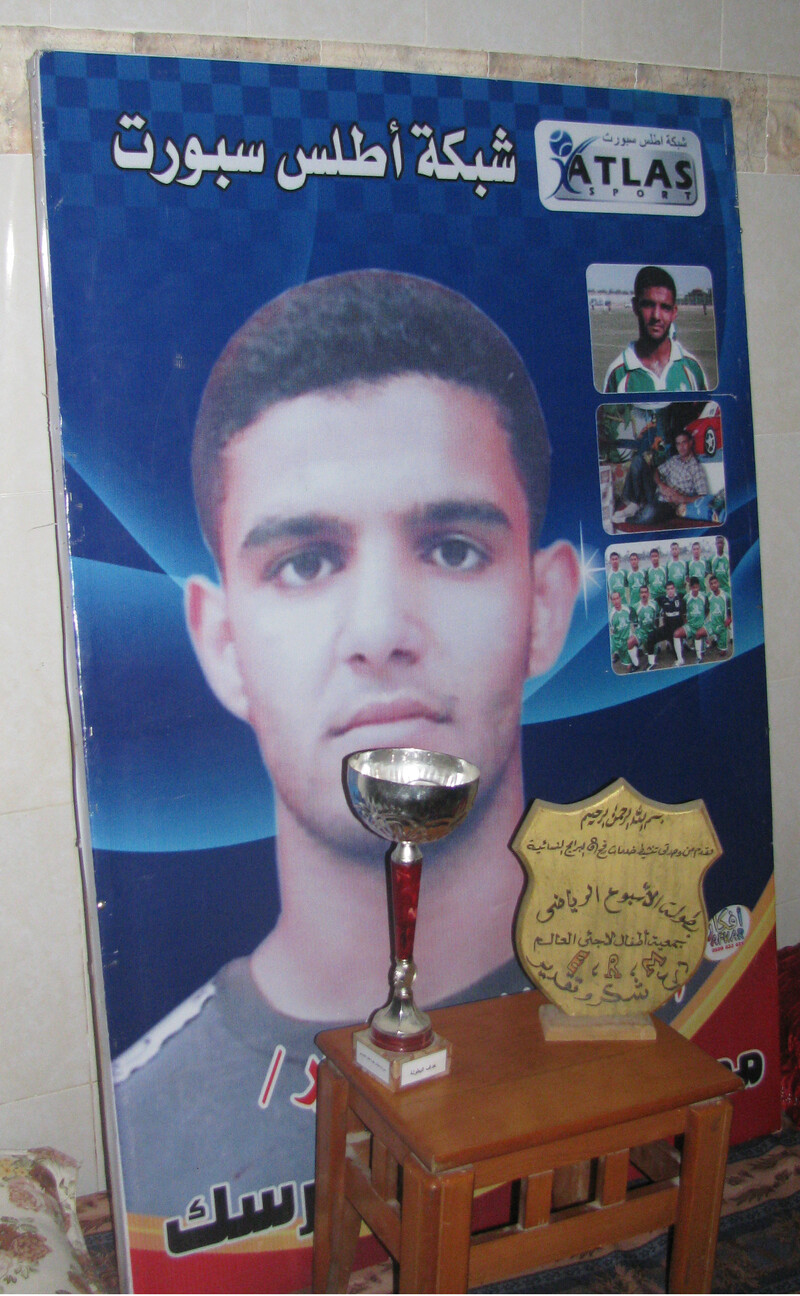Rights and Accountability 24 May 2012
The father of Mahmoud Sarsak, a member of the Palestinian national football team jailed without charge or trial by Israel for almost three years, has called on the sporting world to speak out for his son who remains on hunger strike after more than two months without food.
Ten days ago, more than 2,000 Palestinian prisoners ended a month-long mass hunger strike, but already Israel is violating the terms of the agreement that ended it, according to prisoners’ rights groups.
Sports community must not reward or be silent about Israeli abuses
“For us it is unbearable to see Israel has been awarded the hosting of the UEFA Under 21s football championship in 2013 and gears up to participate in the London Olympics, while it routinely arrests, tortures, imprisons and kills Palestinians, including football players, without consequence,” Mahmoud Kamel Muhammad Sarsak said in a statement given to Stop the Wall.

A poster of Mahmoud Sarsak, and some of his athletic trophies.
The Electronic IntifadaThe younger Mahmoud Sarsak, 25, was detained by Israeli forces as he traveled from his home in Gaza to the West Bank in 2009 to join the Palestinian national football team.
“We ask fellow football players and athletes to speak out in support of Mahmoud - don’t be silent when Israeli cruelty and arbitrariness has destroyed the aspirations of a rising athlete and keeps thousands under inhumane conditions in their jails,” Sarsak said, “We ask sports teams and anti-racist fan clubs to organize in support of Mahmoud and all the other Palestinian political prisoners. Your voice can contribute to saving his life and to a little victory against injustice.”
Earlier this month, Football Beyond Borders, a student-led international organization “which uses the universal power of football to tackle political, social and cultural issues” released a letter of solidarity with Sarsak and thousands of Palestinian prisoners and announced that it would boycott the UEFA 2013 Under-21 European Championships.
And last week, Amnesty International issued an action alert calling on people to contact Israeli authorities regarding Mahmoud Sarsak.
Two prisoners still on hunger strike
Sarsak, now on his 67th consecutive day of hunger strike, is one of two Palestinian prisoners still maintaining their fasts. Akram Rikhawi is on his 43rd day of hunger strike. Both men were visited on 23 May by Mona Neddaf, a lawyer from Palestinian prisoner’s rights group Addameer.
The two “remain on hunger strike and are in increasingly critical conditions, without access to independent medical care,” Addameer said.
Israel violating agreement that ended mass hunger strike
The elder Sarsak’s appeal for solidarity with his son and other prisoners came as Addameer reported in a statement that “Israel has already violated the terms of the agreement addressing the demands of approximately 2,000 Palestinian political prisoners just over one week since they ended their historic mass hunger strike.”
That agreement included limitations on the use of “administrative detention” without charge or trial.
Yet, Addameer said that it:
has already documented cases in which Israel has blatantly ignored the signed agreement as it pertains to the practice of administrative detention. Though the agreement stated that the use of administrative detention would be restricted, multiple extensions of orders for current administrative detainees have been issued this week. Newly arrested persons have also received administrative detention orders.
Currently, 322 Palestinians are held by Israel in administrative detention.
Attempt at force-feeding
Addameer expressed concern about another prisoner, Muhammad Taj, who said Israeli prison guards had attempted to force-feed him:
Mohammad Taj broke his 60-day hunger strike for one day when he was told that his demand to be treated as a prisoner of war would be met, and re-launched it on 15 May when the Israeli Prison Service did not adhere to the verbal agreement. He since ended his hunger strike on 21 May and reported to Ms. Neddaf the details of the ill-treatment he was subjected to after re-launching his hunger strike. According to his affidavit, Mohammad was transferred from Ramleh to Al-Jalameh interrogation center on 15 May. He was severely beaten and his clothes were forcibly stripped from his body. Prison guards also attempted to force milk down his throat.
Bilal Diab and Thaer Halahleh update
Addameer also reported on the conditions of Bilal Diab and Thaer Halahleh:
Ms. Neddaf [Addameer’s lawyer] also visited Bilal Diab and Thaer Halahleh, who ended their 77-day hunger strikes on 14 May. According to Ms. Neddaf, Bilal is experiencing pain in his stomach and head and his body rejects most nourishment except for soup and milk. The prison doctor told him that his recovery period will most likely continue for the next two years. In spite of the agreement to ease restrictions on family visits, Bilal’s mother was denied permission to visit him on the basis of vague “security” reasons two days ago. Thaer is feeling sharp pains in his stomach, pancreas and back. On 20 May, he was transferred to Ofer for interrogation and then brought back to Ramleh prison medical center. Thaer and Bilal are scheduled to be released upon the expiration of their current administrative detention orders, on 5 June and 11 August, respectively. Both noted that they will immediately resume their hunger strikes if the agreement for their release is broken.




